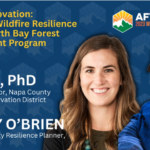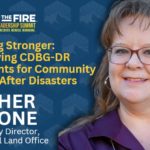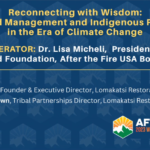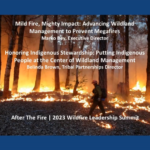Archive for October 2023
Day 3-4: Envisioning Resilience: Our Wish List for Climate Crisis Resiliency Innovations and Development | Dr. Christa López & Andy Winkler
With increasingly severe weather events, ecosystem disruptions, and humanitarian consequences, innovative solutions and resilient strategies are critical for mitigating the damage and protecting vulnerable communities. Swift action is essential to fulfill international commitments, reduce economic losses, and safeguard the well-being of future generations. Hence, the dialogue on addressing the climate crisis is of utmost urgency…
Read MoreDay 3-3: Closing the Information Gap: Through Collaboration and Customer-Inspired Solutions | Shea Broussard
Firefighters often find themselves surrounded by thick smoke, making it difficult to navigate through the vast expanse of a raging wildfire. Every step is uncertain; every decision is crucial. Add to that the lack of detailed knowledge about the terrain, the vegetation, and the fire patterns. Therefore, it’s time we recognize the dire need for…
Read MoreDay 3-2: Keynote | Mike McGuire
Traditional firefighting methods often focus on reacting to wildfires once they have already started. While these methods are crucial for containing and extinguishing fires, they do not address the underlying factors that contribute to the frequency and severity of wildfires. Hence, in the face of increasing wildfire incidents, adopting an all-encompassing approach is crucial in…
Read MoreDay 3-1: Cultivating Climate Resiliency: Unleashing Innovation in Ideas, Technologies, and Systems | Jennifer Gray Thompson
In today’s rapidly evolving world, cultivating climate resiliency has become an increasingly urgent priority. To effectively tackle the complex challenges posed by climate change, harnessing innovative ideas, technologies, and systems is paramount. By fostering an environment that encourages and supports innovative approaches, we can pave the way for cutting-edge advancements in climate resilience. Listen in…
Read MoreDay 2-14: Piloting Innovation: Advancing Wildfire Resilience with the North Bay Forest Improvement Program | Dr. Lucas Patzek & Molly Curley O’Brien
The North Bay Forest Improvement Program is a regional financial and technical assistance program for non-industrial small-scale private landowners in Napa, Sonoma, Mendocino, and Lake Counties in Northern California. It provides planning expertise and funding to help landowners reduce wildfire risks on their forested properties through fuel management projects like vegetation thinning and prescribed burns.…
Read MoreDay 2-13: Rising From the Ashes: Creating Resilient Communities Post MegaFire | Caerleon Safford
The sheer devastation caused by mega-fires amplifies the urgency to address not only the immediate aftermath but also the long-term consequences on the affected communities. However, rebuilding these communities to be resilient requires addressing numerous complex factors that require a strategic and diligent approach rooted in comprehensive research, a thorough understanding of the local context,…
Read MoreDay 2-12: Rebuilding Stronger: Demystifying CDBG-DR Block Grants for Community Recovery After Disasters | Heather Lagrone
In the aftermath of a disaster, it is crucial to swiftly assess the extent of the damage and the immediate needs of the affected community. Whether it’s allocating funds for infrastructure repairs, emergency services, or restoring essential utilities, a well-executed recovery plan is essential. The Community Development Block Grant Disaster Recovery (CDBG-DR) program is a…
Read MoreDay 2-11: Reconnecting with Wisdom: Wildland Management and Indigenous Practices in the Era of Climate Change | Dr. Lisa Mitcheli (Moderator), Marco Bey (Panelist) & Belinda Brown (Panelist)
The integration of Western science and traditional indigenous knowledge represents a powerful approach to fostering healthier landscapes and resilient communities in the face of escalating fire risks. Western science contributes data-driven analysis, cutting-edge technology, and quantitative modeling, while traditional indigenous knowledge offers profound insights derived from centuries of adaptive land management practices and deep connections…
Read MoreDay 2-10: Mild Fire Mighty Impact: Advancing Wildland Management to Prevent Megafires | Marco Bey Honoring Indigenous Stewardship: Putting Indigenous People at the Center of Wildland Management | Belinda Brown
Indigenous communities have lived sustainably on the land for generations, developing a deep understanding of the ecosystems they inhabit. Their knowledge of fire behavior, coupled with their intimate understanding of the local landscape, creates a powerful tool for wildfire prevention. By recognizing the time-honored wisdom they possess, we can advance our strategies for preventing mega-fires. …
Read MoreDay 2-9: Strengthening Communities: The Vital Role of Healthcare Organizations in Climate Resilience and Disaster Recovery | Judy Coffey & Alena Wall
With the increasing frequency and intensity of climate-related disasters, healthcare organizations are faced with tremendous responsibility beyond just safeguarding public health. They are the backbone of a community’s response and recovery efforts. Their expertise, authority, and resources are vital in ensuring the overall health and well-being of communities impacted by calamities. But more than these,…
Read More









